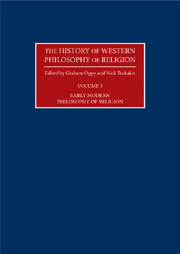Book contents
- Frontmatter
- Contents
- Editorial Introduction
- Contributors
- 1 Early Modern Philosophy of Religion: An Introduction
- 2 Niccolò Machiavelli
- 3 Martin Luther
- 4 John Calvin
- 5 Michel de Montaigne
- 6 Francisco Suárez
- 7 Thomas Hobbes
- 8 René Descartes
- 9 Ralph Cudworth
- 10 Blaise Pascal
- 11 Baruch Spinoza
- 12 John Locke
- 13 Gottfried Wilhelm Leibniz
- 14 George Berkeley
- 15 Voltaire
- 16 The Deists
- 17 Jonathan Edwards
- 18 Thomas Reid
- 19 David Hume
- 20 Denis Diderot
- 21 Immanuel Kant
- 22 Gotthold Ephraim Lessing
- 23 William Paley
- Chronology
- Bibliography
- Index
4 - John Calvin
- Frontmatter
- Contents
- Editorial Introduction
- Contributors
- 1 Early Modern Philosophy of Religion: An Introduction
- 2 Niccolò Machiavelli
- 3 Martin Luther
- 4 John Calvin
- 5 Michel de Montaigne
- 6 Francisco Suárez
- 7 Thomas Hobbes
- 8 René Descartes
- 9 Ralph Cudworth
- 10 Blaise Pascal
- 11 Baruch Spinoza
- 12 John Locke
- 13 Gottfried Wilhelm Leibniz
- 14 George Berkeley
- 15 Voltaire
- 16 The Deists
- 17 Jonathan Edwards
- 18 Thomas Reid
- 19 David Hume
- 20 Denis Diderot
- 21 Immanuel Kant
- 22 Gotthold Ephraim Lessing
- 23 William Paley
- Chronology
- Bibliography
- Index
Summary
The French Genevan reformer John Calvin (1509–64) holds an important place in the development of the theology of the Protestant Reformation. Building on insights articulated by other reformers such as Philipp Melanchthon, Martin Bucer and Huldrych Zwingli, Calvin is perhaps best known for his careful and penetrating biblical exegesis and the production of a compendium of Christian theology that strongly influenced the emergence of Reformed orthodoxy in the latter part of the sixteenth century. Calvin's teachings on divine providence and predestination, the doctrine of sin and the Christian's union with Christ were among his influential contributions to Reformed theology. But Calvin is also known for his doctrine of the natural knowledge of God, roughly, the idea that human beings have some knowledge of God from the light of nature and independent of scriptural revelation. The relationship between this doctrine and traditional natural theology (i.e. arguments for the existence and nature of God) has been a point of controversy among Calvin commentators and philosophical theologians in the Protestant tradition. In this entry I outline this controversy and show why Calvin should be regarded as having made an important, positive contribution to natural theology.
INTRODUCTION
Calvin's educational background and theological work
The structure of Calvin's thought and his influence as a Protestant reformer must be viewed in the light of his own intellectual development and background as a humanist thinker educated in classical literature and law. In 1523, at fourteen years of age, Calvin began his college education (ostensibly in preparation for the priesthood) in Paris at the Collège de la Marche.
- Type
- Chapter
- Information
- The History of Western Philosophy of Religion , pp. 47 - 64Publisher: Acumen PublishingPrint publication year: 2009

